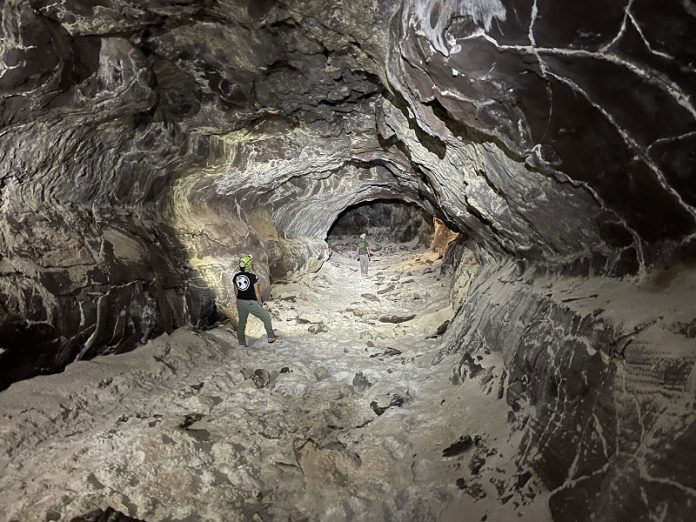
Scientists are exploring Earth’s ancient volcanic caves to uncover secrets that could help us search for life on Mars.
These caves, called lava tubes, form when lava cools and hardens during a volcanic eruption, leaving behind hollow tunnels.
Researchers believe these tubes on Earth are similar to ones on Mars and may hold vital clues about microbial life in the universe.
A team of scientists from the University of South Florida, Portugal, Spain, and Italy recently conducted an in-depth study of six lava tubes on the Spanish island of Lanzarote, located west of North Africa.
Some of these caves are so massive that they host underground concerts.
“We’re the first to carry out such a detailed study of minerals and microorganisms in these lava tubes,” said Bogdan P. Onac, a professor at the USF School of Geosciences.
Using advanced techniques like molecular, isotopic, and mineralogical analysis, the researchers examined deposits inside the caves.
Their findings, published in Communications Earth & Environment, revealed that the volcanic rock in the lava tubes protected minerals and organic compounds from erosion.
This preservation created a kind of natural time capsule, holding records of past ecosystems.
Among the exciting discoveries were preserved biosignatures, including calcium and sodium sulfates. These minerals point to the presence of microbial activity and suggest that bacteria once lived in these caves.
“This study helps us understand changes in Earth’s geological and environmental history. It also highlights lava tubes as important shelters for microbial life, which could have significant implications for astrobiology,” Onac explained.
The findings are especially relevant to Mars, where similar lava tubes are likely to exist.
Like their counterparts on Earth, Martian caves could shield minerals and microbial traces from harsh surface conditions, preserving potential signs of past life.
The discovery of sulfate-rich minerals in Martian lava tubes would be a strong indicator of microbial activity, offering exciting possibilities for the search for extraterrestrial life.
These insights may shape how scientists approach planetary exploration, particularly in missions designed to study Mars’ habitability. By focusing on lava tubes, future missions could prioritize areas with the highest potential for discovering biosignatures.
The team plans to continue their work with studies of new lava tubes in Iceland and other locations. These efforts aim to deepen our understanding of how volcanic caves preserve evidence of life and how this knowledge can guide our exploration of Mars and beyond.
This research highlights how studying Earth’s past can help unlock the mysteries of life in the universe. Lava tubes, once seen as mere geological features, may be key to discovering signs of life on other planets.
Source: University of South Florida.



